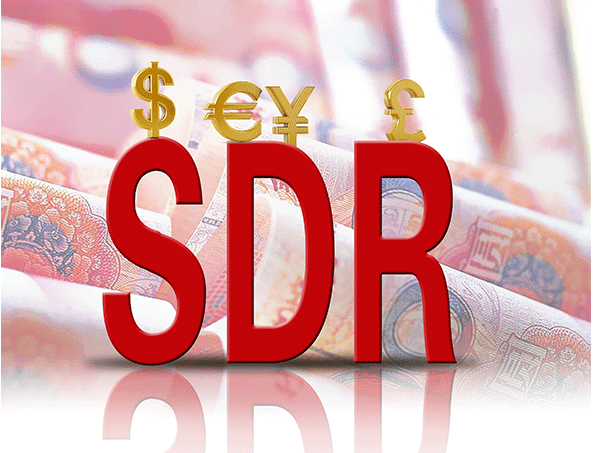(单词翻译:单击)
中英文本
Finance and economics: The yuan joins the SDR Maiden voyage
财经:人民币“入蓝”,软妹币的“第一次”
Reserve-currency status might make for a weaker yuan.
储币地位或令人民币贬值。
PASSING through the Suez Canal became easier earlier this year, thanks to an expansion completed in August.
由于苏伊士运河已于八月扩建完毕,从今年早些时候起,渡过运河变得容易了许多。
Now it is about to become a little bit more complicated.
现在它的结构变得更为复杂了。

Transit fees for the canal are denominated in Special Drawing Rights, a basket of currencies used by the International Monetary Fund (IMF) as its unit of account.
该运河的过境费是以国际货币基金组织(IMF)的特别提款权作为计价的——它是以一揽子货币作为其记账单位的。
This week the IMF decided to include the yuan in the basket from next year, joining the dollar, the euro, the pound and the yen.
本周,IMF决定从明年起接纳人民币“入篮”,“篮子”里已有的货币包括美元、欧元、英镑和日元。
If lots of things were priced in SDRs, the IMF's decision would have forced companies around the world to buy yuan-denominated assets as soon as possible, to hedge their exposure.
因为许多事务都是以特别提款权作为定价的,IMF的决定迫使全球许多公司要尽快地购买以人民币计价的资产,以此来对冲风险。
That would have prompted China's currency to strengthen dramatically.
这将促使人民币大幅升值。
But few goods or services are priced in SDRs.
但是很少有商品或是服务是以特别提款权作为定价的。
Instead, admission to the currency club is significant mainly for its symbolism: the IMF is lending its imprimatur to the yuan as a reserve currency—a safe, liquid asset in which governments can park their wealth.
相反,加入货币俱乐部更多地具有象征意义:IMF正式批准人民币成为一种储备货币——使其成为一种可令各国政府安心寄放的安全、流动的资产。
Indeed, far from setting off a groundswell of demand for the yuan, the IMF's decision may pave the way for its depreciation.
事实上,IMF的决定可能事与愿违,会令对人民币高涨的需求降温,使人民币贬值。
The reason is that the People's Bank of China (PBOC) will now find itself under more pressure to manage the yuan as central banks in most rich economies do their currencies—by letting market forces determine their value.
原因是中国人民银行(PBOC)会发现自己将承受更大的压力来管控人民币,如同世界上大多数富裕经济体的央行管控它们的货币一样——由市场来决定货币的价值。
In bringing the yuan into the SDR, the IMF had to determine that it is “freely usable”.
人民币“入蓝”,IMF必须确定它是能“自由使用”的。
Before coming to this decision, the IMF asked China to make changes to its currency regime.
在做出决定之前,IMF会要求中国政府改变其现有是汇率机制。
Most importantly, China has now tied the yuan's exchange rate at the start of daily trading to the previous day's close; in the past the starting quote was in effect set at the whim of the PBOC, often creating a big gap with the value at which it last traded.
最重要的是,中国现行的每日汇率其开盘价是与前一交易日的收盘价相挂钩的。而之前的开盘价事实上是由中国央行任意确定的,往往会与最终交易价产生较大差价。
It was the elimination of this gap that lay behind the yuan's 2% devaluation in August, a move that rattled global markets.
为了消除这一差价,八月时人民币贬值2%,此举曾令全球市场惊愕不已。
Though the yuan is still far from being a free-floating currency—the central bank has intervened since August to prop it up—the cost of such intervention is now higher.
然而人民币离成为自由浮动货币为时尚早——自八月以来中国央行开始进行干预支持,目前这种干预成本变得更高了。
The PBOC must spend real money during the trading day to guide the yuan to its desired level.
中国央行必须把钱花在刀刃上,用以指导人民币的交易价维持在其期许值以内。
Inclusion in the SDR will only deepen the expectations that China will let market forces decide the yuan's exchange rate.
纳入特别提款权只会加深中国想让市场来决定人民币汇率的期许。
The point of the SDR is to weave disparate currencies together into a single, diversified unit; some have suggested, for example, that commodities be quoted in SDRs to reduce the volatility of pricing them in dollars.
特别提款权将不同的货币交织成为一种单一、多元的计价单位;比如说,有人建议将商品引入特别提款权以减少因美元波动而影响其价格。
But if China maintains its de facto peg to the dollar, the result of adding the yuan to the SDR will be to boost the dollar's weight in the basket, defeating the point.
但如果中国要是继续紧盯美元不放,那么人民币“入蓝”将会令美元币值暴增,一家独大,打破“篮子”里原有的平衡。
What would happen if China really did give the market the last word on the yuan?
如果中国真的给了人民币踏入市场前的临行忠告,那么将会发生什么呢?
For some time it has been under downward pressure.
人民币将会有一段时间的下行压力。
The simplest yardstick is the decline in China's foreign-exchange reserves, from a peak of nearly $4 trillion last year to just over $3.5 trillion now—a reflection, in part, of the PBOC's selling of dollars to support the yuan.
最简单的衡量标准就是中国的外汇储备在下降,从去年顶峰时的4万亿美元到如今的勉强3.5万亿美元——这就是反应。某种程度上,中国央行在抛售美元来支撑人民币。
Were it not for tighter capital controls since the summer, outflows might have been even bigger.
若不是今夏以来更为严格的资金管控,恐怕外流的外汇会更多。
And the yuan does look overvalued.
人民币被高估了。
Despite China's slowing economy, its continued link to the surging dollar has put it near an all-time high in trade-weighted terms, up by more than 13% in the past 18 months.
尽管中国经济放缓,但人民币继续与飙升的美元相挂钩,使其接近了贸易加权计算的历史高位,在过去的18个月里,同比增长超过13%。
With the Federal Reserve gearing up to start raising interest rates at the same time as China is loosening its monetary policy, the yuan looks likely to come under more downward pressure, at least against the dollar.
在美联储加紧启动提高利率的同时,中国放松了其货币政策,人民币兑美元可能至少会承受更多的下行压力。
It would be foolhardy to predict that China will suddenly give the market free rein.
中国会突然给市场以自由发挥的空间可能是鲁莽的预测。
That would go against its deep-seated preference for gradual reform.
那将会违背中国进行渐进式深入改革的偏好。
But while basking in the glow of its SDR status, China must also be aware of the responsibility to minimise intervention that comes with it.
但沉浸于特别提款权的荣光中,中国必须意识到对人民币干预最小化的责任也随之而来了。
A weaker yuan may well be the result.
其结果可能会出现人民币贬值。
重点讲解
1.thanks to 多亏;由于
例句:I have given thanks to God for delivering me from that pain.
我感谢上帝把我从那种痛苦中拯救出来。
2.be aware of 意识到
例句:Be aware of the terrible strain it can put on a child when you expect the best reports
在期待孩子能取得最好成绩时,要当心这会给他们带来可怕的压力。
3.monetary policy 货币政策
例句:Some countries tighten monetary policy to avoid inflation.
一些国家实行紧缩银根的货币政策,以避免通货膨胀。
4.foreign-exchange reserves 外汇储备
例句:China's foreign-exchange reserves are about to hit one trillion dollars.
中国的外汇贮备将达一万亿美元。


